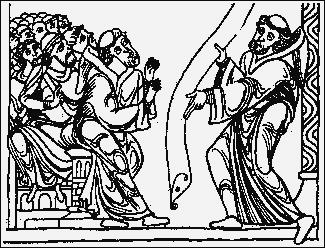![]()
Gode
Cookery Presents

True stories, fables and anecdotes from the
Middle
Ages
|
Abbot Odo, the great 10th
century clerical reformer, received some
of his greatest opposition from the monastery in Fleury, France, where
the monks fervidly resisted his attempts at social, political, and
moral
change within their order. When the Abbot, attended by two bishops,
arrived
at the monastery, an eyewitness was there to record the scene. The
monks,
forewarned of Odo's coming, barricaded the entrance. Then, arming
themselves
with swords and shields they went on to the roof of the building "as
though to hurl stones and missles at their enemy." Others, guarding
the door, said they would rather die than admit the abbot from another
monastery. Later they sent a deputation to show Odo their charters of
independence.
For three days the resistance continued; they even threatened to kill
Odo.
At last, unknown to anyone, the abbot mounted a donkey. On this humble
steed, unattended and unarmed, he approached Fleury. Straightway the
recalcitrant
monks "throwing away their arms went out to meet him and embraced
his feet." In such a fashion were these symbol-conscious monks
of the Middle Ages won over to obedience by Odo's humility.
On another occasion the signs, hissings and facial contortions - which were used in lieu of speech when it was necessary to break the rule of silence - became a stumbling block to Odo and his reforming monks. One of Odo's party, a monk called Adolfus, was washing his shoes, preparatory to the rite of the washing of feet that was about to take place according to St. Benedict's Rule. One of the "unreformed" brethren passed by and saw him. "Tell me where St. Benedict orders monks to wash their shoes?" he asked Adolfus angrily. The brother made a sign for him to be quiet, as the monk was breaking the rule of silence. At that the monk even more angrily said, "Who are you that come to preach the Rule to your betters? You pounce like a hawk on our property, and refuse to talk. God did not make me a serpent to hiss as you do, nor an ox that I should bellow. No. He made me a man with a tongue in my head - to talk with." While he kept on barking out remarks like this, Adolfus hurridly retired. Excerpts from: Life in Medieval Times by Marjorie Rowling. New York: The Berkely Publishing Group, 1979.
Monks retired early, although their rest was not always sufficient, as the stories of the perpetually tired monk illustrate. To sleep outside of designated hours was considered a serious offense. The Cluniacs introduced a custom according to which a lantern was placed in front of a sleeping monk, which he then had to carry with him until he found another monk who had dozed off. Naturally, falling asleep during choral prayers was especially reprehensible. Caesarius of Heisterbach tells of a monk who fell asleep so frequently during choral prayers - "a most horrible occurrence" - that Christ himself finally descended from the cross and gave him such a slap on the ear that he died within three days. At night the monks slept in their own beds in communal dormitories, in full attire in accordance with the Rule of St. Benedictine; one monk probably was in charge of making certain that his brethren really slept. Excerpts from: Leben im Mittelalter by Hans-Werner Goetz (Albert Wimmer, translator). Notre Dame: University of Notre Dame Press, 1993. |


